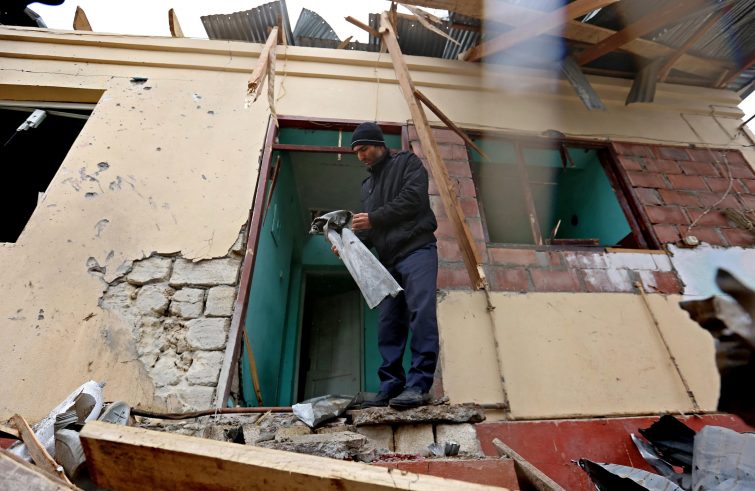
“There are over 200 victims. As many as 320 have died and they are all 18 to 24 year-olds, soldiers deployed at the battlefront. Not only Armenians, innocent people are dying also on the other side and all this is happening because of disgraceful politics that no one can stop. Please, put an end to all this!”. Contacted in Yerevan, Monsignor Raphaël François Minassian, Archbishop for Catholics of Armenian Rite in Eastern Europe, voiced his concerns over a conflict that not only is continuing but is also alarmingly expanding to include other countries. The dispute over Nagorno-Karabakh is escalating into an increasingly violent and deadly conflict. Trench warfare intensified with the involvement of long-range missiles. More worryingly, however, the clashes between the Armenian Armed Forces and Azerbaijani Armed Forces could act as a catalyst to reignite dormant conflicts between countries, especially since Turkey announced support for Baku. The OSCE Minsk Group, co-chaired by France, Russia and the United States, declared that the armed conflict is “an inadmissible threat to the stability of the region” and called for an “immediate ceasefire” between Armenians and Azeris. “If these continuous aggressions are not stopped – said Archbishop Minassian – the conflict risks expanding. Unless a limit is set, there is a danger of making the same mistake that led to the 1915 genocide.”
 The Armenian Catholic Church is committed to offering assistance to the most seriously hit. “Above all, our efforts are dedicated to providing shelter and help to refugees arriving from villages along the Nagorno-Karabakh border,” the Archbishop said .
The Armenian Catholic Church is committed to offering assistance to the most seriously hit. “Above all, our efforts are dedicated to providing shelter and help to refugees arriving from villages along the Nagorno-Karabakh border,” the Archbishop said .
More than 1,200 refugee families are in need of immediate help.
“We just sent a letter to Caritas Spain, with which we were already in close contact. It’s a small drop but little drops make the ocean.” Msgr. Minassian told SIR that the casualties wounded on the battlefront – whose “exact number is still unknown” – are being brought to our hospitals in Yerevan. But there is a shortage of medicines and prosthetic hands, feet and arms. Unfortunately, injuries from wars are the same all over the world, shattering young lives.
 With no access to the sea, with closed borders to Azerbaijan and Turkey, and with only one access route to Georgia, Armenia was already an economically depressed and poor country before the outbreak of the armed conflict past July. Armenian emigrants abroad outnumber those who remained in the country, leaving this land without youths and inhabited by elderly people living alone. “This war – the Armenian Archbishop remarked – is aggravating the conditions of poverty in the population also since the government is currently focusing all efforts on strengthening border defences. It’s an extremely delicate moment. It is not my intention to be pessimistic or see the situation in purely negative terms, but this is the situation today and we can only be realistic.” People are gathering in prayer. “I had never seen the churches so full of people as in the past few days, Minassian said. “The parents of soldiers on the battlefront especially are gathered in prayer in churches across Armenia. It’s the testimony of a Christian people rooted in the faith.”
With no access to the sea, with closed borders to Azerbaijan and Turkey, and with only one access route to Georgia, Armenia was already an economically depressed and poor country before the outbreak of the armed conflict past July. Armenian emigrants abroad outnumber those who remained in the country, leaving this land without youths and inhabited by elderly people living alone. “This war – the Armenian Archbishop remarked – is aggravating the conditions of poverty in the population also since the government is currently focusing all efforts on strengthening border defences. It’s an extremely delicate moment. It is not my intention to be pessimistic or see the situation in purely negative terms, but this is the situation today and we can only be realistic.” People are gathering in prayer. “I had never seen the churches so full of people as in the past few days, Minassian said. “The parents of soldiers on the battlefront especially are gathered in prayer in churches across Armenia. It’s the testimony of a Christian people rooted in the faith.”
Appeal to the European Union. “Once again, it is an appeal for peace,” the archbishop said. “We call on the European Union to intervene to put an end to the warfare. We are not asking for advice on cease-fire but for concrete measures to stop the armed conflict once and for all. There are strong international interests in oil and gas in the area. Everyone has their own business. My message to everyone is: don’t gamble on the lives of the people of Armenia and Azerbaijan. Human life is far more precious than oil and gas. Let us prevent interests from blood-staining the hands of the powerful. Let us prevent a fistful of dollars from sparking off war and causing people to die. This madness must be stopped.”











